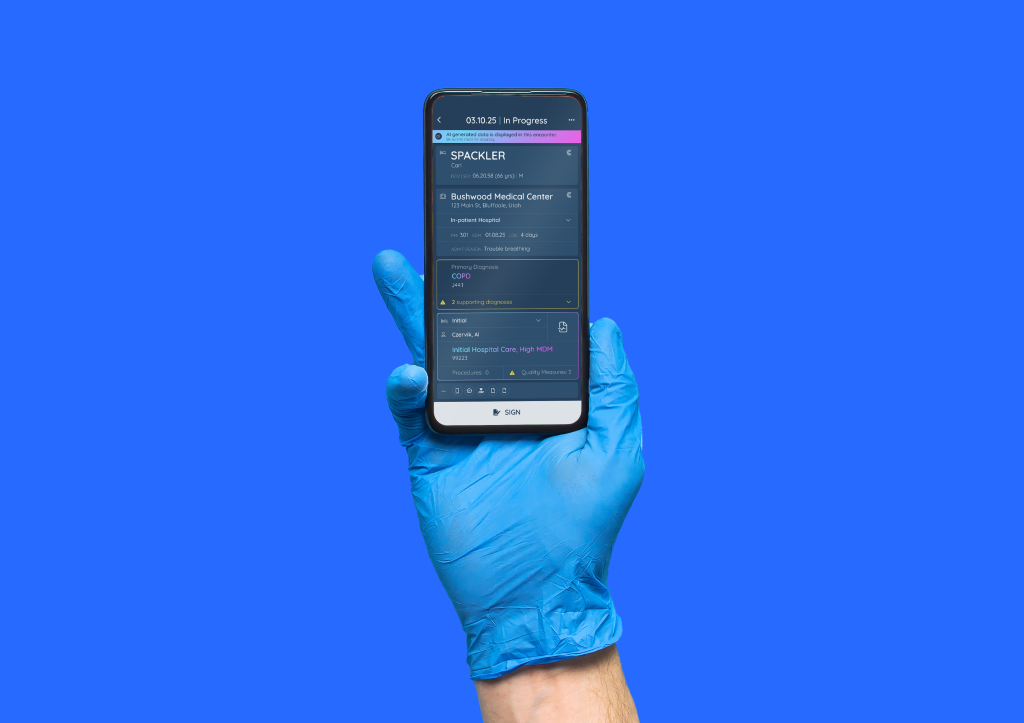Claimocity Claims
AI Tools That Are Shaping
The Future of Healthcare

Remember when you chose medicine because you wanted to be drowning in paperwork? Probably not. The reality of modern healthcare has pushed administrative burdens to unsustainable levels, with physicians spending nearly half their workday on documentation and administrative work instead of patient care, or better yet, their personal lives.
So, the rise of artificial intelligence couldn’t come at a better time. These technologies offer practical solutions that help doctors improve accuracy and take back their time. These aren’t futuristic concepts or beta tests—they’re real tools being used right now by forward-thinking physicians who want to work smarter.
WHAT AI REALLY MEANS IN HEALTHCARE
Let’s clear something up: AI in healthcare doesn’t mean robots are taking over. It means doctors can use smart tools that automate repetitive work, spot missing info, and help teams stay ahead of denials. Think of it like a really sharp assistant that never forgets a step and always double-checks your work. These advanced AI tools are analyzing images and scans, monitoring patient data for subtle changes, streamlining communication, even predicting which patients might need additional attention, and handling routine tasks that steal hours from a physician’s day.
AI is genuinely revolutionizing healthcare, improving accuracy, enhancing treatment, and creating better patient experiences. But let’s not forget what this means for you as a provider: getting home before dinner, ditching weekend documentation, and actually being able to take some vacation days. These tools are helping deliver better medicine and a better quality of life.
AI TOOLS EVERY DCTOR SHOULD KNOW ABOUT
Across every corner of medicine, AI is transforming how providers work, offering faster insights, sharper documentation, and smarter workflows. Here are a few standout platforms changing the game for doctors today:
Butterfly iQ
Butterfly iQ is a pocket-sized, AI-assisted ultrasound device that connects to smartphones, putting diagnostic imaging capabilities in your pocket. It eliminates the need for scheduling and waiting for traditional ultrasound appointments by offering real-time scanning at the point of care. This device includes helpful AI tools, such as automatic measurements, allowing physicians to make faster decisions and reduce reliance on radiology departments for many common imaging needs.
Cleo Health
Managing acute and emergency care is time-intensive, but Cleo Health uses AI to lighten that load. This AI-powered tool listens to conversations between doctors and patients and turns them into clear, accurate medical notes, helping doctors save time. Cleo also gives suggestions during the visit, like pointing out risks or making sure important details aren’t missed, so providers can make faster, more informed decisions.
Dragon Medical One
Dragon Medical One is a cloud-based, AI-powered speech recognition software designed specifically for healthcare documentation. The system converts speech to text with remarkable accuracy, even recognizing complex medical terminology, so physicians can dictate notes on the go rather than spending hours typing after their shifts end. Claimocity users can access Dragon’s capabilities directly through our desktop platform, making it even easier to chart.
Doximity GPT
This tool takes generative AI and tailors it for medicine. It is an AI writing assistant that helps draft clinical letters, patient education materials, and administrative communications with medical accuracy. Unlike general AI writing tools, it understands medical context and terminology, making it valuable in healthcare settings. Instead of starting from scratch, doctors get smart, editable drafts that save time and improve consistency.
PathAI
No more waiting until the end of the month to discover missing charges. AI tools continuously cross-reference documentation with billing data, flagging discrepancies when they appear, helping you fix problems while they’re fresh rather than trying to reconstruct what happened weeks ago.
Viz.ai
Viz.ai is a platform designed to help speed up stroke detection and response. And when it comes to strokes, every single minute matters. When a stroke is suspected, every minute of delay can lead to more severe brain damage. This platform analyzes brain scans in real time and immediately alerts the appropriate specialists so they can act faster. That means patients get evaluated and treated sooner, which can lead to better outcomes and a smoother emergency workflow for providers.
AI in Healthcare Isn't a Trend, It's a Tool
And it’s going to be around for the foreseeable future. These tools are already helping doctors save time, improve documentation, and support better decisions. And these tools and platforms? They’re only getting smarter. And they’re getting smarter rapidly.
While not every provider needs every tool, it’s important to keep your finger on the pulse and be aware of industry innovations. Because when the right solution fits into your workflow, it doesn’t just save time; it redefines what’s possible.
Join the AI Movement with Claimocity’s AI Charge Capture
There are amazing innovations happening in the healthcare industry, but one of the most tedious things is billing and coding that steal hours from your week. Claimocity tackles the paperwork that follows you home at night.
Our AI Charge Capture reads your notes and finds billable services automatically, improving accuracy and saving you time. No extra typing. No manual coding. Just review what the AI suggests and click approve. Simple as that.
Ready to stop wasting time on billing and coding? Schedule a demo today to see how Claimocity’s AI Charge Capture can free up your schedule so you can spend more time doing what matters to you.
Frequently Asked Questions
Will AI replace doctors?
No. AI automates routine tasks but can’t replicate the judgment, expertise, and critical thinking physicians bring to patient care. These tools eliminate busy work so doctors can have more time caring for patients or reclaim time for their personal lives.
How can AI improve accuracy in healthcare?
AI can help catch things that might be easy to miss. It flags trends, spots issues early, and even supports diagnosis by recognizing patterns in data. It also improves coding and billing accuracy by automating the process and catching errors before they cause delays.
Is there AI for doctors?
Yes! AI tools designed specifically for healthcare professionals are rapidly emerging to help with everything from reading scans to managing schedules and automating billing tasks.


